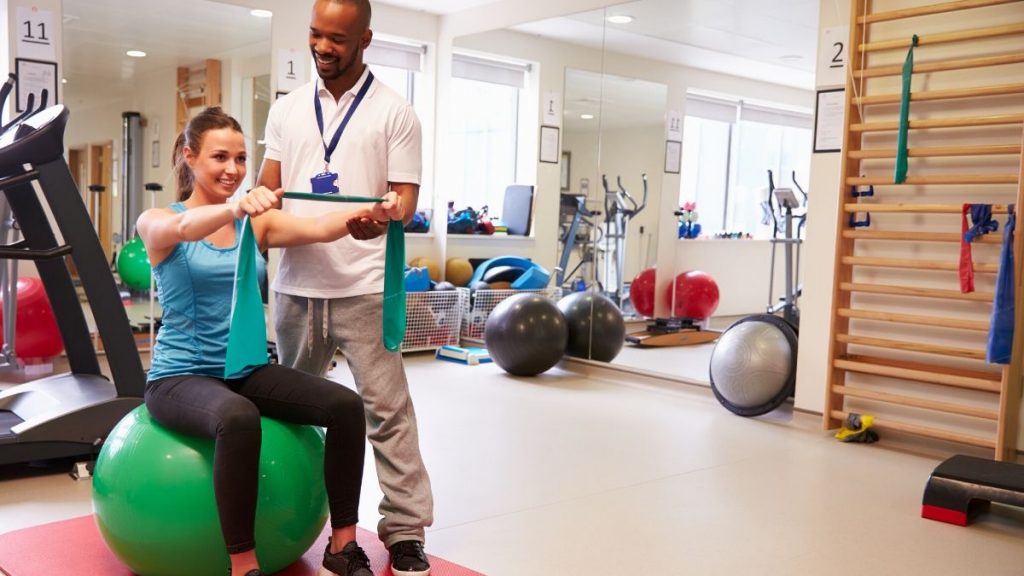Last updated on November 8th, 2023 at 12:50 pm

If you plan to make a career in physiotherapy or are a recent graduate, you might be confused about where to take your career. What kind of jobs you can get? Are there any alternative career options for physiotherapists other than clinical jobs?
In this
- 1) Jobs in government, corporate hospital
- 2) Physiotherapy clinics as career options after physiotherapy
- 3) Part time physiotherapist jobs in special school
- 4) Sports Physiotherapy
- 5) Government disability project
- 6) Non-governmental organisation NGOs
- 7) Academics jobs in physiotherapy
- 8) Entrepreneurship as an alternative career option for physiotherapists
1) Jobs in government, corporate hospital

Many individuals aspire to work in government jobs, and nothing is wrong with that. Newspapers often advertise job vacancies, which you can browse and apply to. These opportunities may arise in state government hospitals, central government hospitals, or PSU hospitals.
Additionally, defence organisations such as BSF, CRPF, and the Indian Army may recruit physiotherapists for their medical teams. You can also seek employment in corporate hospitals like Apollo and others, which offer attractive salaries for freshers. Once you are employed in a hospital, you may be assigned to any of its five different departments and may be required to carry out duties accordingly.
Physiotherapy OPD
The Physiotherapy Outpatient Department, commonly known as OPD, is a crucial part of any healthcare facility. It is where patients come to seek physiotherapy treatment on an outpatient basis, meaning they are not admitted to the hospital. As a fresh physiotherapy graduate, it is essential to understand that the OPD is where you will spend most of your time.
It is where you will encounter patients with various musculoskeletal, neurological, and cardiorespiratory conditions, and your primary responsibility will be to provide them with the best possible treatment to help them recover and improve their quality of life.
The OPD is equipped with all the necessary tools and equipment needed for physiotherapy treatment, such as ultrasound machines, electrotherapy equipment, exercise equipment, and more. As a physiotherapist, you will be responsible for assessing the patient’s condition, creating a personalized treatment plan, and providing the appropriate physiotherapy techniques to help them recover.
In summary, the OPD is a vital component of any healthcare facility, and as a fresh physiotherapy graduate, you must be prepared to work in this environment. It is a challenging but rewarding job that requires patience, dedication, and a passion for helping patients with physical limitations.
Physiotherapy in hospital indoor
As a physiotherapist, your role in the hospital setting is crucial for the overall health and well-being of indoor patients. Your primary objective is to promote movement, function, and mobility in patients who are recovering from an illness, injury, or surgery. In addition, you will also be responsible for preventing further deterioration of the patient’s physical condition and minimizing the risk of complications during their hospital stay.
To achieve these goals, you will need to perform a thorough assessment of the patient’s physical condition, taking into account their medical history, current health status, and any pre-existing conditions that may affect their recovery. Based on your assessment, you will develop an individualized treatment plan that includes a range of exercises, stretches, and other therapeutic techniques designed to improve the patient’s physical function and mobility.
Your role also involves educating patients and their families about the importance of physical therapy and how it can help them recover faster and more effectively. You will need to communicate with other members of the healthcare team, including doctors, nurses, and other therapists, to ensure that the patient’s treatment plan is integrated and coordinated with other medical interventions.
Intensive Care Unit or ICU

As a physiotherapy graduate, you will play a critical role in the hospital ICU. The ICU, or Intensive Care Unit, is where patients with the most severe injuries and illnesses are treated. Many patients are connected to machines and require constant monitoring and care.
Your role as a physiotherapist in the ICU will be to help these patients regain their physical function and mobility. This is important because immobility can lead to many complications, including muscle weakness, loss of range of motion, and even respiratory failure.
To achieve this, you will work closely with the medical team to develop treatment plans that are tailored to each patient’s individual needs. You will also provide ongoing assessments to monitor progress and adjust the treatment plan.
Your treatment plan may include exercises to improve strength, range of motion, and balance, as well as breathing exercises to help patients improve their lung function. You may also use modalities such as electrical stimulation and ultrasound to help reduce pain and swelling.
In addition to providing direct patient care, you will also play a key role in educating patients and their families on how to continue their recovery after leaving the ICU. This may involve providing instructions on exercises and other treatments that can be done at home.
Overall, your role as a physiotherapist in the ICU is critical to the recovery of patients with severe injuries and illnesses. By helping patients regain their physical function and mobility, you can help them achieve the best possible outcomes and improve their quality of life.
Rehabilitation department
The rehabilitation department is perhaps the most important for a physiotherapist. It is the department where the actual physiotherapy comes into play. Your role is to help patients recover from injuries, illnesses, or surgeries that have affected their physical abilities. Your main goal is to restore their movement, strength, and function as much as possible so that they can regain their independence and quality of life.
To achieve this, you will need to assess each patient’s condition, identify their physical limitations and goals, and design a personalized treatment plan that includes a range of exercises, manual therapies, and other interventions. You may work with patients who have a variety of conditions, such as neurological disorders, orthopedic injuries, cardiopulmonary problems, or chronic pain.
Throughout the rehabilitation process, you will need to monitor your patient’s progress, adjust their treatment as needed, and provide ongoing support and encouragement. You will also need to work closely with other healthcare professionals, such as doctors, nurses, occupational therapists, and speech therapists, to ensure that your patients receive comprehensive and coordinated care.
In addition, as a physiotherapist in the rehabilitation department, you may also be responsible for educating patients and their families about their conditions, treatments, and self-care strategies. You may also need to document your patients’ progress and communicate with insurance providers or other stakeholders about their care.
Also read: How to become a good physiotherapist
2) Physiotherapy clinics as career options after physiotherapy
The second point in our list of alternative jobs for physiotherapists in private clinics. A fresher struggling with his career may land in a physiotherapy clinic or Physiotherapy Centre. Although you won’t be paid a handsome salary here, you will get very good exposure on how to handle a Physiotherapy Centre if you are planning to have your own in future.
You will get to learn how to market your clinic; you will get an idea of how to deal with the patients and how to talk to them. These things are very important in addition to how you treat and how to cure your patient. These aspects are also very important.
3) Part time physiotherapist jobs in special school
Special schools are different from regular schools; these schools are meant for differently-abled children, the children who are physically disabled or mentally disabled. They have a different set of arrangements in the school. They have a special educator who teaches them, and they are different from regular teachers. Their way of teaching is different.
There is a rehabilitation department where physiotherapists have a very important role in treating physically disabled children. They handle physically disabled children in Association with an
4) Sports Physiotherapy
Nowadays, most central and national sports teams have a dedicated physiotherapist. Sports physiotherapy is a specialized field of physiotherapy that focuses on the prevention, treatment, and management of injuries related to sports and exercise. As a sports physiotherapist, you will work with athletes of all levels, from amateurs to professionals, to help them recover from injuries, improve their performance, and prevent future injuries.
Your role as a sports physiotherapist will involve a thorough assessment of the athlete’s injury or condition, followed by the development of a tailored treatment plan that may include a range of techniques, such as manual therapy, exercise prescription, and electrotherapy.
You will also work closely with coaches, trainers, and other healthcare professionals to ensure that the athlete is receiving the best possible care and rehabilitation. In addition to treating injuries, you will also provide advice on injury prevention, training techniques, and the importance of proper nutrition and rest for optimal performance.
To excel in the field of sports physiotherapy, you will need to have a strong knowledge of anatomy, physiology, and biomechanics as well as excellent communication and interpersonal skills to effectively work with athletes, coaches, and other healthcare professionals.
5) Government disability project

The government have lots of disability projects. There are community-based rehabilitation projects inside the interior pockets of parts of India, like Sarva Shiksha Abhiyan National Rural Health Mission, NRHM.
All these have projects related to disability. So you can apply for it through the advertisements, and you can get into it; it’s very good to start your career with, but it is not good to carry on it. For being a fresher, it is a good career option
6) Non-governmental organisation NGOs
Some NGOs with good reputations also pay very handsome salaries to their physiotherapist, like Handicap International. It is an international-level NGO that pays very well to its rehab professionals. There are also state-level NGOs you can join to start your career with.
7) Academics jobs in physiotherapy
Every year, new physiotherapy colleges are coming up in your city or area. So, in addition to patient care and clinical jobs, you may consider joining a physiotherapy institution as an academician. Academic jobs in physiotherapy are positions within universities or higher education institutions that involve teaching, research, and administration related to physiotherapy.
These roles require you to have a deep understanding of the subject matter and the ability to communicate complex ideas to students. As an academic in physiotherapy, you will be responsible for designing and delivering courses, developing teaching materials, conducting research, supervising students, and contributing to the wider academic community.
It’s important to note that academic jobs in physiotherapy can be highly competitive and may require additional qualifications or experience beyond your initial physiotherapy degree. It is perfect for a female physiotherapist who does not want to involve herself in clinical jobs. It’s a 5 to 8 job and an excellent alternative job for physiotherapists who can also handle their clinic part-time.
8) Entrepreneurship as an alternative career option for physiotherapists
After getting 2 to 3 years of experience working in clinics and dealing with patients, you can set up your clinic. This is our final point in the list of alternative jobs for physiotherapists. Setting up your clinics is a difficult task, but if you get the success you will, it will fetch you like anything. But, if you follow a few lesser-known physiotherapy marketing ideas, success is not too far.
You can visit my online store Physiocapsule, where you will get various tools to grow your physiotherapy clinic, like an exercise chart and leaflets you can download. I have put all my best effort and 12 years of physiotherapy experience to make this list. However hard work I put there’s a chance that I may have missed some points and maybe I might have somewhere wrong.
Keep Reading: Secret tips to setting up physiotherapy centre & skyrocket practice
The author is a physiotherapist who has been practising for the last 17 years. He holds a Bachelor's in Physiotherapy (BPT) from SVNIRTAR (Swami Vivekananda National Institute of Rehabilitation and Research), one of the prestigious physiotherapy schools in India.
Whatever he learns dealing with his patient, he shares it with the world through blogs and e-books. He also owns a YouTube channel, "Sunit Physiotherapist" with over 8 lakh active subscribers. Here, he shares everything he gets to learn serving the patient.






Pingback: How to Become a Physiotherapist After 12th - Physiosunit
Pingback: Physiotherapy marketing strategy: 4 Secret Tools to Skyrocket Practice : Physiosunit